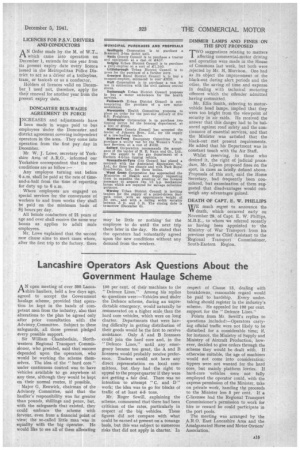Lancashire Operators Ask Questions About the Government Haulage Scheme
Page 17

If you've noticed an error in this article please click here to report it so we can fix it.
AN open meeting of over 300 Lancashire hauliers, held a few days ago, agreed to accept the Government haulage scheme, provided that operation be kept in the hands of competent men from the industry, also that alterations to the plan be agreed only after prior consultation with the Advisory.Committee. Subject to these safeguards, all those present pledged every possible support.
Sir William Chamberlain, Northwestern Regional Transport Commissioner, who presided, said that success depended upon the operators, who would be working the scheme themselves. The idea of the " hard core" under continuous control was to have Vehicles available to go anywhere at any time, although they would be kept on their normal routes, if possible.
Major G. Renwick, chairman of the Advisory Committee, said that the haulier's responsibility was far greater than pounds, shillings and pence, but, with the safeguards that existed, they could embrace the scheme with fervour, even from a financial point of view; the so-called little man was in eqnality with the big ciperator. He would like to see all of them allocating 100 per cent, of their machines to the "Defence Lines." Among his replies to questions were:—Vehicles used under the Defence scheme, during an unpredictable emergency-, would' naturally be remunerated on a higher scale than the hard core vehicles, which were on long charter. Departments that were having difficulty in getting distribution of their goods would be the first to receive assistance. Only A and B licensees could join the hard core and, in the "Defence Lines," until any emergency became too great, the A and B licensees would probably receive preference. Traders would not have any direct representation on local committees, but they had the right to appeal to the proper quarter if they were not getting a fair deal. There was no intention to attempt "C. and D" work; the idea was to go for blocks of traffic of at least 4-5 tons.
Mr. Roger Sewill, explaining the scheme, commented that there had been criticism of the rates, particularly in respect of the big vehicles. These figures did not compare with what could he earned at present on a tonnage basis, but this was subject to numerous risks that did not apply in charter. In respect of Clause 13, dealing with breakdowns, reasonable regard would be paid to hardship. Every undertaking should register in the industry's scheme. He appealed for 100 per cent. support for the "Defence Lines."
Points from Mr. Sewill's replies to questions included:—Operators carrying official traffic were not likely to be disturbed for a considerable time; if, for instance, the Ministry of Supply and Ministry of Aircraft Production, however, decided to give orders through the scheme they would be dealt with. If otherwise suitable, the age of machines would not come into consideration; tippers were not wanted for the hard core, but mainly platform lorries. If hard-core vehicles were not fully employed the operator could, with the express permission of the Minister, take on private work, handing the proceeds to the Minister less 5 per cent. If a C-licensee had the Regional Transport Commissioner's permission to work for hire or reward he could participate in the port pools.
The meeting was arranged by the A.R.O. East Lancashire Area and the 'Amalgamated Horse and Motor Owners' Association,




















































